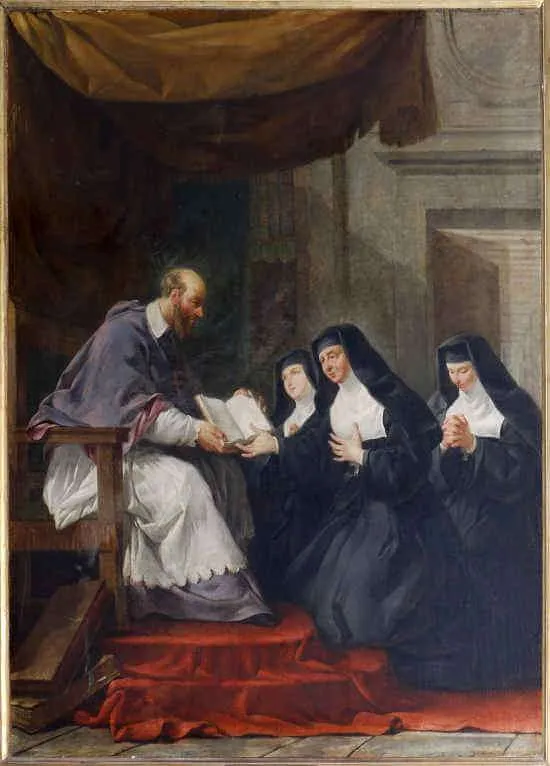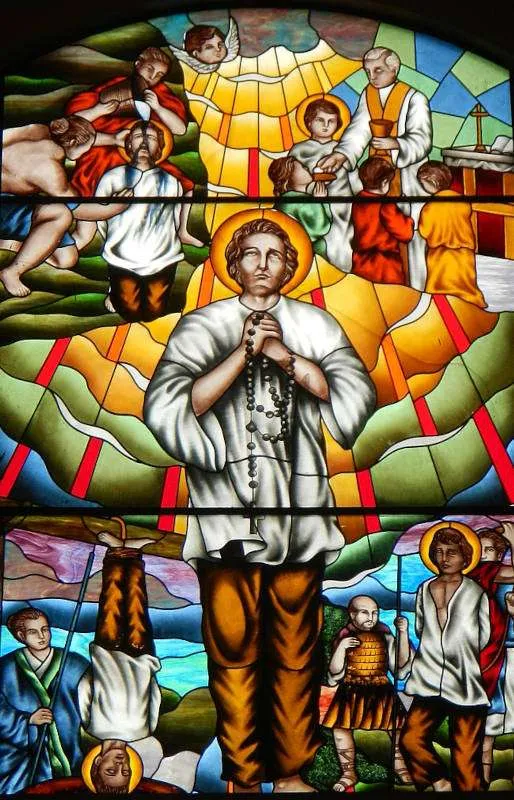1572–1641; Patron Saint of forgotten people, parents separated from their children, and widows; Invoked against in-law problems; Canonized by Pope Clement XIII in 1767
Saint Jane Frances de Chantal, born Jeanne-Françoise Frémiot in Dijon, France, was born into an influential and noble family. Her father held the position of President of the Parliament of Burgundy. Tragically, Jane lost her mother at the tender age of eighteen months, an event that profoundly impacted her early life. Despite this hardship, her deeply religious father ensured that Jane and her siblings received an excellent education and were raised as devout Catholics. Jane was recognized for her intelligence and piety from an early age, and her beauty, faith, strong moral character, and personal virtues were widely acknowledged. Her brother pursued a religious life, becoming first a priest, and later the Archbishop of Bourges.
When Jane was twenty, she married Baron Christophe de Rabutin, also known as Baron de Chantal. His baronial title, signifying high noble rank, was either bestowed upon him by the king or inherited, bringing with it a set of rights and responsibilities. Christophe and Jane resided in the feudal Castle of Bourbilly, which served as the administrative, military, and governing center of the town. As a baron, Christophe was tasked with managing lands, governing, collecting taxes, and providing military support to the king when needed. The castle not only served as their family residence but was also home to numerous servants and administrative staff. Prior to his marriage to Jane, the baron lived a disorderly life, leading to disorder among the castle staff. As the new baroness, Jane’s refined and orderly life led her to quickly restore order, to the delight of all the staff. She even brought back the practice of daily Mass at the castle. The baron and baroness had seven children together, but the first three did not survive infancy. One boy and three girls did survive.
In fulfilling his baronial duties, Christophe was frequently summoned by the king for administrative and military tasks, often requiring him to be away from home. During his absence, Jane maintained a custom of dressing very modestly, a habit viewed by some as unsuitable for nobility. When confronted, Jane would typically reply, “The eyes of the one whom I aim to please are very far away.” Her modesty and purity of heart prevailed.
Eight years into their marriage, when Jane was twenty-eight, her husband was accidentally shot in the leg by his friend while hunting. Nine days later, due to the inadequate medical care of the time, he succumbed to his wound, leaving Jane a widow. She and her four children spent the next year living with her father in Dijon. As her marriage had constituted her life, Jane needed to discern God’s will for her future while caring for her children. After consistently praying for a holy spiritual director, Jane had a vision of a saintly priest whom she did not recognize. She understood this figure to be God’s chosen spiritual director for her; she simply had to await their meeting. On another occasion, while praying, she visualized herself traveling through a forest in a futile search for a church. Reflecting upon this image, she understood that she had an arduous journey ahead, one that would purify her soul from self-love and lead her to serve Christ selflessly.
After a year with her father, Jane and her children moved into an old castle with her widowed father-in-law, helping manage his household. Despite her father-in-law’s coarse character, she treated him with kindness and respect.
In 1604, Jane’s father invited her to Dijon to attend a Lenten mission to be preached by the renowned Bishop of Geneva, Francis de Sales. Upon arriving at the mission, she immediately recognized the holy bishop, not from a previous meeting, but as the priest from her vision whom God revealed would be her spiritual director. After the mission, Bishop de Sales agreed to serve in that role. As her spiritual director, Bishop de Sales’ primary duty was to assist Jane in ordering her soul. He helped her address scruples, focused her prayer life, and reminded her of her responsibilities to her children, father, and father-in-law.
Over the next six years, Jane maintained regular correspondence with Bishop de Sales through letters and, when possible, in person. This fostered a deep mutual respect and a holy bond of spiritual friendship. Jane split her time caring for her father in Dijon and her father-in-law in Monthelon. After her husband’s death, Jane had made a private vow of celibacy, and her desire to join a religious order grew stronger. Bishop de Sales dissuaded her from this while her children were still young. However, as they grew older, she revisited the idea. Bishop de Sales informed her of his inspiration to establish a congregation for women, especially for those not accepted into other religious houses due to poor health or age, which would focus on humility and meekness, in imitation of the virtues exemplified by the Blessed Virgin Mary at the time of the Visitation. Instead of being a cloistered convent of nuns who followed a strict discipline of asceticism, the women would live a simpler life of prayer and then tend to the sick, poor, and others in need. In addressing her obligations to her children, the bishop helped her realize that she could serve them more spiritually as a consecrated religious than in the world. After all, they were now of an age where they could take care of themselves. In 1610, one of her daughters died, and another got married. Her fourteen-year-old son was entrusted to the care of her father and her brother, the bishop. Jane then moved to Annecy, France, with her two daughters, one married and the other soon-to-be. On June 6, 1610, the Solemnity of Trinity Sunday, Jane formally entered religious life, co-founding the Order of the Visitation of Holy Mary with the future saint, Bishop Francis de Sales.
In 1609, Bishop de Sales wrote a book called Introduction to the Devout Life, which was made up of letters of spiritual guidance especially for married women seeking to grow in holiness. This book proved invaluable to Mother Jane de Chantal and her sisters as they sought to live out their new vocation. In 1616, the bishop wrote another book called Treatise on the Love of God that was more directed to his spiritual daughters who were seeking practical wisdom on how to immerse themselves daily in the will of God and His divine love.
In addition to establishing her new convent in Annecy, Mother de Chantal made frequent visits to Dijon to care for her aging father and to visit her son and other relatives. She also began founding convents. By the time that her co-founder, Bishop de Sales, died in 1622, they had founded thirteen convents. Saint Vincent de Paul served as her spiritual director after this, and by the time that Mother Jane de Chantal died in 1641, she had founded eighty-six convents.
Saint Jane de Chantal began her life within the world of the nobility, embraced her marriage with deep devotion, raised children with motherly love, became a widow, discerned a new calling to religious life, and became a spiritual mother to many new daughters.
As we honor this wife, mother, baroness, founder, religious, and saint, ponder the fact that Christ led her down a path she could never have discerned early in life. She responded to promptings of grace over and over, and God did incredible things through her. Know that God’s plans for your life might not be what you expect. Every cross and every twist and turn in life has the potential to be a new beginning to a new and glorious life. Allow this saint to inspire you wherever you find yourself on life’s journey.
Source: https://mycatholic.life/saints/saints-of-the-liturgical-year/august-12—saint-jane-frances-de-chantal-religious/








